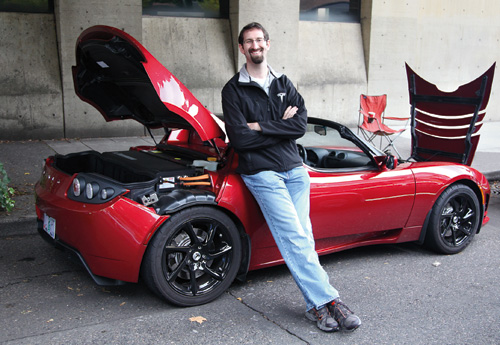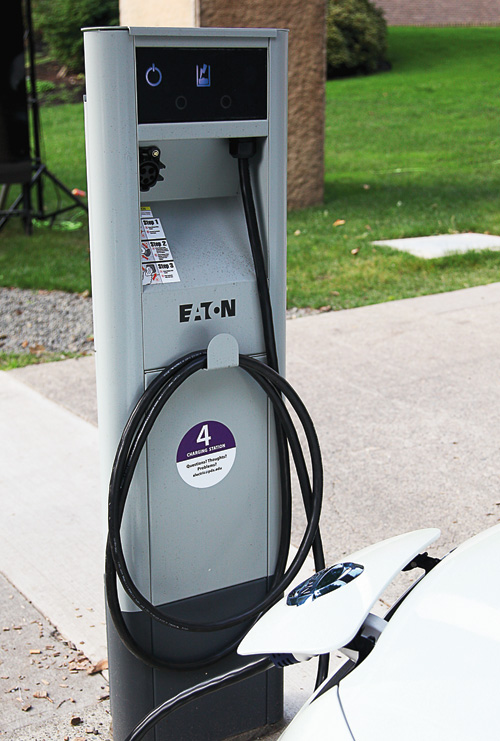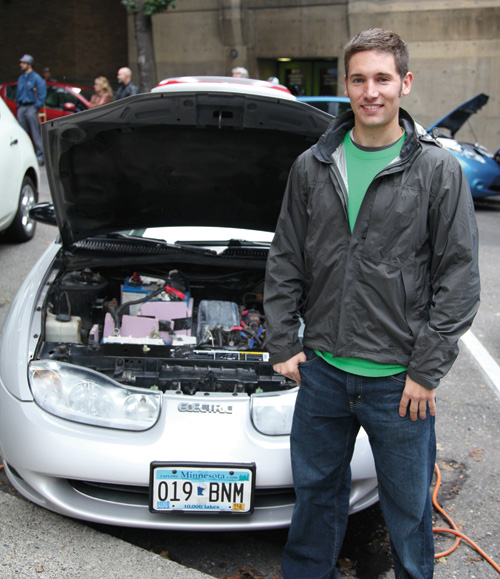 Two years ago, electric vehicles were going to save the world and Oregon in particular. There would be several models on the market to choose from, they all would be fast and go far, and there would be as many charging stations dotting I-5 as Ducks fans on game day. Manufacturers and politicians alike were expecting everyone to dive into the deep end of the EV pool. But consumers have been slow to embrace the new technology.
Two years ago, electric vehicles were going to save the world and Oregon in particular. There would be several models on the market to choose from, they all would be fast and go far, and there would be as many charging stations dotting I-5 as Ducks fans on game day. Manufacturers and politicians alike were expecting everyone to dive into the deep end of the EV pool. But consumers have been slow to embrace the new technology.
By Kristen Hall-Geisler
 |
Above: Nathan Los and his red Tesla on Electric Avenue near Portland State University. It was either this car, or none, says Los.Below: A charging station on Electric Avenue.// Photos by Alexandra Shyshkina |
 |
Two years ago, electric vehicles were going to save the world and Oregon in particular. There would be several models on the market to choose from, they all would be fast and go far, and there would be as many charging stations dotting I-5 as Ducks fans on game day. Manufacturers and politicians alike were expecting everyone to dive into the deep end of the EV pool. But consumers have been slow to embrace the new technology. As Mitsubishi’s Maurice Durand says about the EV Promised Land: “If anyone’s talking in terms of five years, make it 20.”
Buying an EV has become less of a boutique experience and more like buying any other car. Electric-only dealerships are nearly a thing of the past, with Green Tech Automotive selling low-powered neighborhood electric vehicles from NmG in Portland, and Grants Pass Electric Vehicles selling NEVs and electric motorcycles. The more powerful commute-friendly Nissan Leaf is available through Nissan dealerships now, and Mitsubishi has taken 400 total preorders in four states, including Oregon, for its i-MiEV electric car. Durand says the company has modest volume targets to push the infrastructure, since it is taking consumers longer to adopt the new technology than Mitsubishi had anticipated.
Electric cars from a few major manufacturers were expected to be on sale in 2010, but they are only now arriving at dealerships. The EVs available today go faster and farther on a charge than most EVs of the past and a few early adopters in Oregon seem to be willing to plunk down the cash to be emissions-free. In April 2009, there were 130 electric-only vehicles registered in Oregon, and many of those were conversions of gasoline-powered cars done by enthusiasts. In October, there were 880 passenger electric vehicles registered, not counting commercial vehicles.
While consumers are slow to warm up to the EV idea, Oregon electric vehicle manufacturing is also struggling to find its spark. BYD, a company courted by Gov. Ted Kulongoski two years ago, has yet to establish any manufacturing outside its home base in China. Think!, a Norwegian company also wooed by Oregon boosters, built its U.S. plant in Plainfield, Ind. Even homegrown EV businesses have struggled over the past two years; electric ATV builder Barefoot Motors closed its Ashland-based business in late 2010. EV-only dealership EcoMotion closed its doors in 2009.
There are a couple of bright spots. Another Ashland EV company, Brammo, is selling its electric motorcycles in Best Buy and expanding its European sales. There’s also Arcimoto, the Eugene company founded by Mark Frohnmayer and championed by Nathan Fillion of ABC’s Castle, which is nearing production of its SRK small electric vehicle.
 |
Above: Quinn Sullivan converted his Saturn into an electric car because he was tired of rising gas prices.Below: The 2011 Nissan Leaf is available in a dozen or so test markets, including Oregon. Reservations for the 2012 Leaf are now being taken in 23 states, with another seven to be added by the end of the year.// Photos by Alexandra Shyshkina |
 |
The number of charging stations also is growing. In order to make EVs a reliable form of transportation, charging stations have to be nearly as numerous as gas stations. There were 20 public charging stations in Portland and Salem in autumn 2009; ECOtality has since brought that to a total of 325 residential charging stations and 92 publicly available charging stations in cities along the I-5 corridor in Oregon. The proliferation of charging stations is accelerating, according to Sen. Jeff Merkley, with a goal of 800 private and 800 public charging stations, along with a dozen quick-charging ones, being installed in the next two years.
In 2009, a company called eTec launched its EV Project, with a goal of installing 2,500 charging stations nationwide. The project would partner with Nissan and owners of its all-electric Leaf to collect and analyze charging data to improve the networks that will be installed in the future. Last year, eTec changed its name to ECOtality North America, and its EV Project was granted an additional $15 million by the U.S. Department of Energy in June 2010, bringing its total project funding to $230 million.
ECOtality’s charging stations are being installed at retail outlets, with two chargers at Woodburn Company Stores and two at the Portland IKEA, the company’s first chargers in the United States. A direct-current charger, the first in the nation, was installed at the Hollywood Fred Meyer in Portland in October. It can bring an EV battery from zero to 80% charged in 30 minutes. The EV Project also added the Chevy Volt as a partner in installing the residential chargers, bringing the total to 8,300 electric vehicle drivers participating nationwide. These early adopters each get a $1,200 credit toward home charging stations installed by ECOtality.
Bringing TV stars and European furniture superstores on board the electric-powered bandwagon gets the word out that the cars and chargers are on the market, but it will be some time before the infrastructure and the vehicles are ready for prime time.


